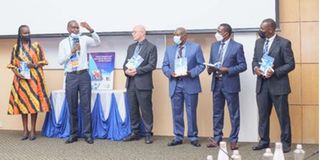New books launched to provide knowledge on blue economy

Chief Editor Prof George Outa addresses delegates during the launch of The Book of Abstracts’ and the “Science, Research and Innovation for Harnessing the Blue Economy” books in Gigiri, Nairobi on March 3, 2022. Looking on from left to right are CAS Ministry of Education Sara Ruto, Programme Management Officer of Sustainable Blue Economy Initiative Ole Vestergaard, CAS State Law Office Prof Micheni Ntiba, CAS Ministry of Agriculture, Livestock, Fisheries and Cooperatives Lawrence Omuhaka and Stockholm Environment Institute Africa Director Dr Philip Osano.
Four years after Kenya hosted the first ever blue economy conference, two books detailing how the world can use science and research to attain marine sustainability have been unveiled.
The books, one titled Book of Abstracts: The Science and Research Symposium and the other Science, Research and Innovation for Harnessing the Blue Economy have been launched by the government of Kenya in partnership with the Stockholm Environment Institute (SEI).
The former is a publication of the abstracts that were submitted for presentation in the science and research segment of the Sustainable Blue Economy Conference (SBEC) held in Nairobi in November 2018 while the latter is a synthesis publication of the presentations.
The publishers believe that the books will create a record of a wide range of critical science and research topics, including technological possibilities that were highlighted during the 2018 summit.
Blue economy
Speaking during the launch at the World Agroforestry Centre in Gigiri, Nairobi chief editor of the publications Prof George Outa said readers and researchers across the globe now have a reference point on all matters blue economy, as the books explain in fine detail every little aspect of the sector.
“These books will be used in future studies on this topic. It will provide the right literature review and understanding about the blue economy,” he said.
In his foreword for the Book of Abstracts, Principal Secretary, State Department of Fisheries and Blue Economy Dr Francis Owino says the publication depicts Kenya’s efforts at bringing to the fore the role of hard-core scientific evidence to the policy table.
“There were close to 70 abstracts submitted to the organizing committee. Each of the abstracts reflects insights, knowledge and critical scientific concerns that are unique,” he writes in the 74-page book.
Environmental solutions
Prof Micheni Ntiba, who was the chair of the organising committee of SBEC in 2018 says in his preface that academic institutions have a unique role in establishing engagements in supporting blue economy initiatives and must serve as frontiers of new discoveries to sustain environmental solutions.
“Academic institutions must remain centres for pure and curiosity driven research. They must serve as reservoirs of scientific knowledge that may have immediate application.”
After demystifying the blue economy, the book looks deeply into investments in blue economy research, innovation and human capital before explaining the role of infrastructural economics and marine spatial planning.
It delves into climate change, education on the sector, aquaculture resources, pollution, maritime security, fisheries, regulatory regimes, community involvement, use of non-biological resources and climate action resilience with experts from around the globe giving their experiences and potential solutions.
Climate action
Inside the 132 pages of the Science, Research and Innovation for Harnessing the Blue Economy book, the authors look at key presentations made during SBEC 2018 such as ocean science, sustainable use of mineral and energy resources of the blue economy, climate action, smart shipping, management of coastal zones and maritime governance.
Looking beyond SBEC 2018, the book takes you through the breadth of Africa’s blue economy and prospects for advancing the promise of the global blue economy.
“This book behoves us to rely on academia to help us demystify the very concept of the blue economy,” says Amb Macharia Kamau, Principal Secretary, Ministry of Foreign Affairs.
He urges universities and research centres to prioritise their talent pipelines and encourage the reciprocal flow of ideas.
“Industry players should tap into the value found in the social sciences,” he said.





